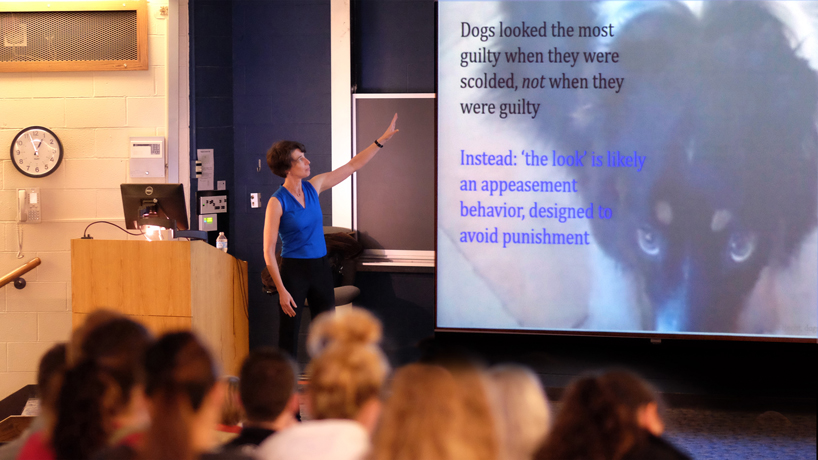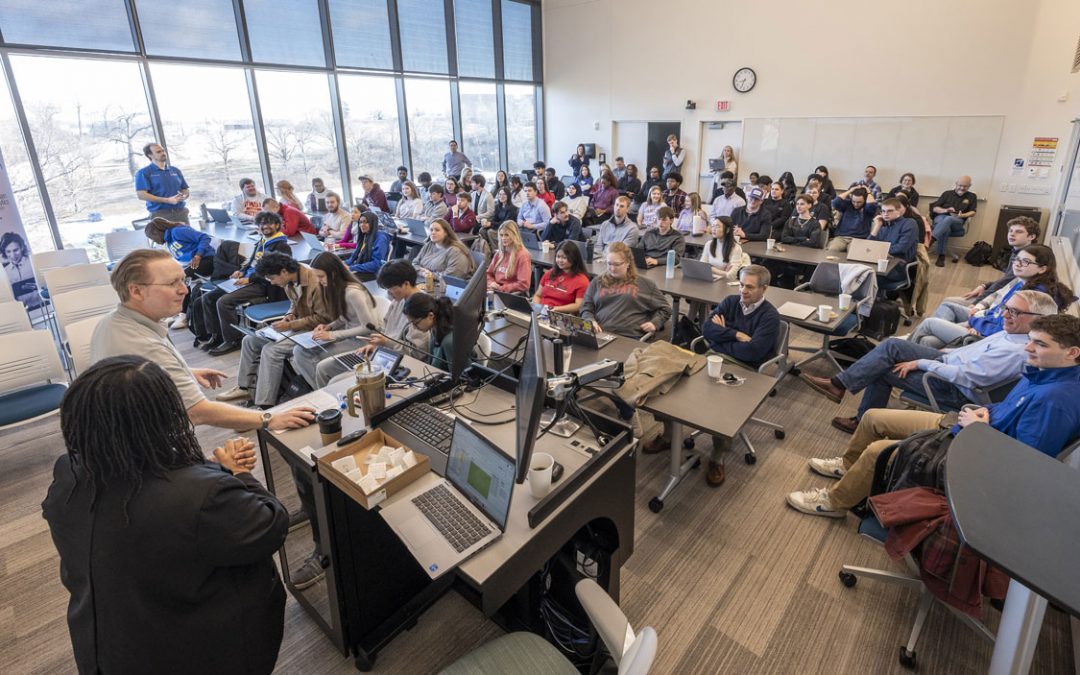
Alexandra Horowitz, author of “On Looking: Eleven Walks with Expert Eyes” and The New York Times bestseller “Inside of a Dog,” spoke at UMSL for the College of Optometry’s 13th annual Fechner Day lecture. (Photo by August Jennewein)
It turns out a kiss from your dog is more than an unabashed display of affection.
“Your dog is actually saying, ‘Yes, I love you, but can I also have a little bit of that sandwich you consumed earlier,” said Alexandra Horowitz, author of “On Looking: Eleven Walks with Expert Eyes” and The New York Times bestseller “Inside of a Dog.”
Horowitz was at the University of Missouri–St. Louis on Oct. 24 to deliver the College of Optometry’s 13th annual Fechner Day lecture. Her discussion, titled “Examining Others’ Points of View,” touched upon the assumptions we make that animals have a human understanding, how several individuals can all perceive a scene differently and how many species “see” using more than their eyes.
On the latter, Horowitz talked about dogs’ keen sense of smell. She noted, for example, that a dog might be having an extraordinary experience when stopping to sniff what appears to humans as nothing more than an ordinary fencepost.
“When we jerk our dogs away from a smell on a walk, it’s kind of like driving to the Grand Canyon and then being slapped in the face as soon you arrive,” Horowitz said.
Scott Lewis, a junior in the Pierre Laclede Honors College and vice president of the UMSL Pre-Optometry Club, said the presentation was useful and relevant to the career he’s pursuing.
“The interdisciplinary aspects of the presentation were interesting because they broadened my perspective on a variety of commonplace scenarios and gave me insight to the way dogs and other people think,” Lewis said.
Lindsay Swenson, a second-year optometry student, said she appreciated learning about Horowitz’s findings on one of her studies. It involved noting the different observations made by an urban wildlife expert, a naturalist, a geologist and a blind person after they each walked the same city block with Horowitz.
“I try to notice my surroundings and observe new things, but I have a different perspective than others due to my experience and knowledge,” Swenson said. “I think it would be interesting to do a similar project, even with friends, to see how each person’s perspectives may lead them to notice different aspects of the environment.”
Carl Bassi, associate professor of optometry at UMSL, had experienced a Fechner Day while a graduate student at Vanderbilt University and organized the original Fechner Day at UMSL in hopes it would catch on. Now in its 13th year, the event has featured several prominent psychophysicists. But why celebrate Gustav Fechner?
“Fechner is consider the founder of psychophysics,” Bassi explained. “Psychophysics states that one can understand how the nervous system functions by carefully measuring a stimulus – the ‘physics’ – and measuring some behavior – the ‘psycho’ – in a response to that stimulus.”
A good example in optometry, Bassi said, is the visual acuity chart.
“It uses precisely measured stimulus – letters – at a precise distance – typically 20 feet – as a specific contrast of letter to measure visual acuity,” he said. “Fechner’s principles have been applied to a wide variety of fields in optometry, psychology, physics, business and aesthetics.”
Scott Lewis, the Pre-Optometry Club vice president, called this year’s lecture, which ended in dessert, a winner from start to finish.
“’Examining Others’ Points of View’ started with Dr. Horowitz discussing the optic nerve and the blind spot and ended with German chocolate cake,” Lewis enthused. “So there was really nothing to dislike!”















